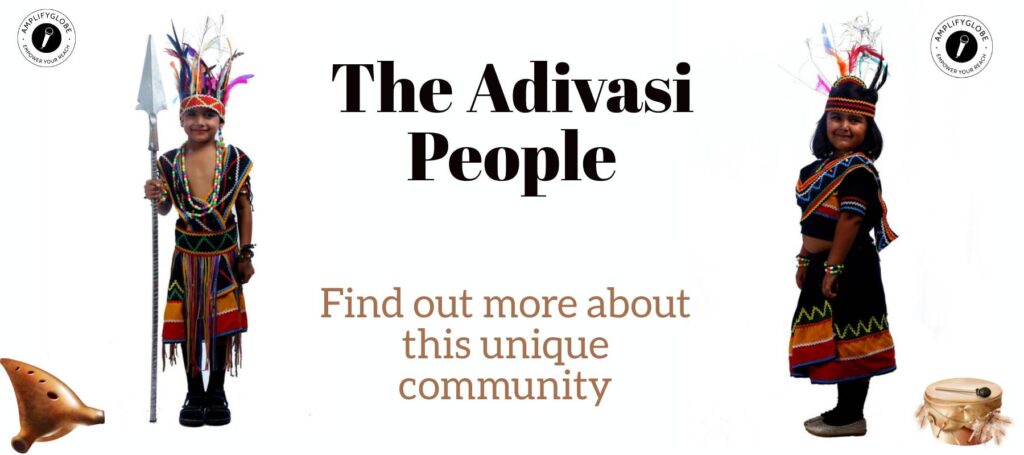India, a land of immense diversity, is home to a myriad of cultures, languages, and traditions. Among its unique tapestry of communities, the Adivasi people stand out as the original inhabitants and guardians of ancient wisdom and heritage. These indigenous tribes have inhabited the Indian subcontinent for centuries, living in harmony nature and embodying a rich cultural legacy that continues to inspire and awe the world. In this blog, we shall delve deep into the lives of the Adivasi people, their vibrant culture, and timeless traditions.

As we continue to learn about and appreciate the Adivasi people and their traditions, let us remember the cultural identity of other indigenous groups such as the Aymareas, the Sami and the Kazakh among others.
The Adivasi Identity
The term “Adivasi” signifies “original inhabitants” or “first people,” capturing the essence of their deep-rooted connection the land they have inhabited for generations. Spread across different regions of India, these communities are a diverse group, each its unique customs, languages, and beliefs. Over 700 recognized tribes in India represent a mosaic of distinct cultures, according to estimates.
Cultural Diversity and Traditions
Adivasi culture is a treasure trove of artistic expression, folklore, music, dance, and handicrafts. Each tribe nurtures its customs, traditions, and rituals that reflect their spiritual beliefs and relationship the environment. While the customs might vary, some common threads unite them all.
- Close Ties to Nature: Adivasi people are renowned for their profound connection nature. They revere the forests, rivers, mountains, and wildlife as sacred entities, which influence their daily lives and spiritual practices. Traditional agriculture, hunting, and gathering methods are practised sustainability and respect for the ecosystem.
- Oral Traditions: The Adivasi tribes have preserved their history, mythology, and knowledge through oral traditions. Folk tales, legends, and songs are passed down from generation to generation, keeping their history alive and vibrant.
- Art and Craftsmanship: Adivasi art is a reflection of their vibrant cultural heritage. Their artistic expression finds form in intricate paintings, pottery, weaving, and unique patterns in their clothing. Each tribe has its distinct artistic style that showcases its identity.
- Festivals and Rituals: Festivals hold a special place in Adivasi life. People mark celebrations fervour, colour, and communal gatherings. Many festivals have links to agricultural cycles, and others connect to worshipping deities or ancestral spirits.
Notable Adivasi Tribes and Their Traditions
- Santhals: The Santhal tribe, primarily residing in the states of Jharkhand, West Bengal, and Odisha, is one of the largest and most well-known Adivasi communities. Their life revolves around music and dance, the “Santhali” dance being an integral part of their cultural celebrations.
- Gonds: The Gonds, found predominantly in Madhya Pradesh, Chhattisgarh, Maharashtra, and Telangana, have a rich heritage of art and craft. Their “Gond” paintings, characterized by intricate patterns and vibrant colours, depict stories from their mythology and daily life.
- Bhils: The Bhil tribe, skilled archers and hunters, inhabits Gujarat, Rajasthan, Madhya Pradesh, and Maharashtra. Their festivals, like Bhagoria, involve matchmaking and marriages among young people.
- Jarawas: The Jarawas, one of the indigenous tribes of the Andaman and Nicobar Islands, have lived in relative isolation for centuries. They maintain a hunter-gatherer lifestyle and possess an in-depth knowledge of the island’s biodiversity.
Challenges and the Path Ahead
Despite their rich cultural heritage, Adivasi communities face several challenges in the modern world. They are often marginalized, facing issues such as poverty, lack of access to education, healthcare, and land rights. Encroachment on their traditional lands and natural resources threatens their way of life and identity.
Nonetheless, there is hope as various governmental and non-governmental organizations are working towards empowering Adivasi communities, preserving their cultural heritage, and promoting sustainable development.
The Adivasi people of India are the custodians of a cultural heritage that transcends time and reflects a harmonious relationship nature. Their art, traditions, and way of life hold invaluable lessons for the world. As we move forward, it is imperative to recognize, respect, and support the Adivasi communities in their journey to preserve their heritage, foster sustainable practices, and cherish the rich tapestry of their culture and traditions. Together, let us celebrate their uniqueness and embrace the wisdom they offer to humanity.